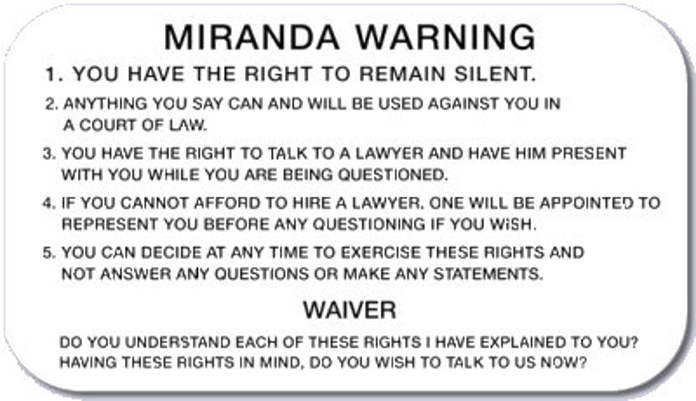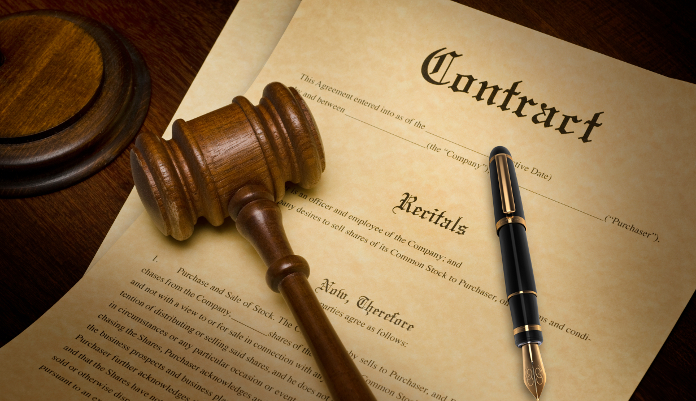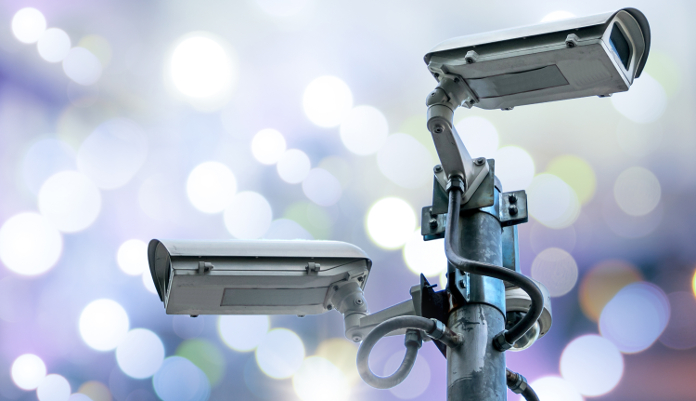1. Law Enforcement does not always have to Mirandize You.
During an initial consultation, many of my criminal clients tell me that they were never read their Miranda rights. If the client wasn’t read his or her rights, that’s usually the very first thing that I hear about. You’ve heard the rights given ad nauseum on TV:
- 1) You have the right to remain silent;
- 2) Anything you say can be used against you;
- 3) You have the right to an attorney;
- 4) If you cannot afford an attorney, one will be appointed for you.
When arrested, the law enforcement officer is not required to read you your Miranda rights. There is only one set of circumstances when an officer is required to read a suspect their Miranda rights:
- 1) The person is in custody (a reasonable person would believe that he/she is not free to leave), and
- 2) The person is interrogated/questioned (or confronted with statements that would cause a reasonable person to make an incriminating statement).
2. Whether or not You are Mirandized, DON'T TALK!
Even if you are being investigated, you are not in custody, and you have not been “Mirandized,” you STILL do not have to answer law enforcement officers’ questions! The right to remain silent is so important to protecting you that the United States Supreme Court said in Miranda v. Arizona that under certain circumstances, the police have to warn you not to talk to them! Yet people do it every day. You have a right to remain silent. Exercise it. Like the old football adage, when you pass, three things can happen and two are bad. Except when questioned by law enforcement, providing a statement is worse: talking can ONLY result in bad things.
If there is sufficient evidence to charge you with a crime, you will not be able to talk your way out of the charge. You might talk your way into contradicting solid evidence or confessing (rightly or wrongly), but you won’t walk because you’re a smooth talker. So don’t talk.

If there is not enough evidence to charge you with a crime, you will not be charged. In a close call, you shouldn’t be charged simply because you wouldn’t give a statement. (People who tick off the police may be more likely to get charged with a crime, but better to win that fight in a courtroom.) Many times, when the evidence is solid or when the officer has already determined to charge someone, they won’t question you because they don’t need to. Sure, you may think refusing to answer puts a burr up their saddle. It probably does. However, it is often in close calls when an officer may not have enough evidence to charge a crime, but a confession would neatly tie together circumstantial evidence. Therefore, the officer proceeds in a fishing expedition to gather enough evidence to bring a charge. Your statement could be just the evidence the police need.
3. You can't use your Statement to defend Yourself
Assume for a moment that you talk, defy the odds and do an amazing job. The amazing statement that you just gave is NOT admissible in court to aid in your defense. Read that again. You cannot use your statement when it counts: in court. Courtroom evidence rules prohibit you from using your own statement to defend yourself. They call that a “self-serving statement” and it is considered to be hearsay. Read that again: You can’t use your own statements to defend yourself in court. The only way to defend yourself in court (with your own words) is to take the witness stand. A tremendous amount of consideration must be given before an attorney would ever let his client take the witness stand. If you find yourself in a position where you may need to testify to defend yourself in court, it is better to wait and find out what all of the allegations are and what the evidence is before making a comment. And it’s better to make only one comment, when it counts, to a jury (and heaven forbid you ever have to be in that situation!). The last thing you want is trying to defend the statement you gave on day one when there was an incomplete understanding of the allegations or the facts.
4. You can't be sure that the Cop makes an accurate Report
Continue assuming that made the world’s best statement. It was airtight. It was eloquent. Not only can’t you use it in court, but you can’t prevent the cop from taking your statement down wrong. It’s amazing how many times a General Offense report says that my client confessed, and my client says, “I never said that!” If you gave a statement and the cop took it down wrong, the only way to now defend yourself is take the witness stand and tell the jury the cop is either lying or he didn’t do his job right. You will have to deliver the oration of a lifetime! Good luck.
5. Your Statement will be used against You in Court - Perhaps out of Context
Keep assuming that your statement was amazing. Another great reason not to talk: if you make a statement, your words CAN be used against you. That’s Miranda warning number 2. Even though your words cannot be used in aid of your defense because they are self-serving hearsay, your words are NOT considered to be hearsay when the prosecutor wants to use them against you. Instead, they call this a "statement against penal interest." Statements against interest are not hearsay and constitute admissible evidence. This is a common trial tactic: the prosecution will introduce only portions of your statement, perhaps out of context or incomplete, because they can use your words against you. The only way to rebut your own statement is to take the witness stand. Once you take the witness stand to defend yourself, the prosecutor can cross examine you, asking you all sorts of questions about what happened, as well as bring up other things from your past that would be irrelevant if you weren't on the witness stand. Give a statement now and guarantee the need to take the witness stand later! Good luck!
6. Ask to Talk to your Attorney
You have a right to have an attorney present for questioning. If they really want your statement, the government will pay an attorney to come sit with you (flashing neon lights again should be going off!). If you absolutely must give a statement because you absolutely have to talk your way out of the charge, get an attorney. They call that “lawyering up.” It also puts a burr up their saddle. But there’s nothing they can do about it, and a trained, experienced attorney will help control the conversation. An attorney keeps the cops at bay. Even more important, if you have to tell the police something, an attorney’s comments can’t be used against you, so if you must talk your way out of the charge, you can at least do it through an attorney. That way, you stay off the witness stand. An attorney protects your interests when you need to talk to the police (re-read paragraph one). If you are a suspect in an investigation, whether arrested or not, whether Mirandized or not, you should NEVER submit to questioning without first asking to talk to a trained, experienced attorney.


 Should I Pay the Waiver?
Should I Pay the Waiver? Felony THC Possession
Felony THC Possession Forming an LLC
Forming an LLC Anatomy of a DUI Case
Anatomy of a DUI Case A Criminal Case: From Arraignment to Trial
A Criminal Case: From Arraignment to Trial Winning a Social Security Disability Case
Winning a Social Security Disability Case 6 Questions About Chapter 7 Bankruptcy
6 Questions About Chapter 7 Bankruptcy 8 Reasons to Have a Will
8 Reasons to Have a Will 9 Divorce and Custody Questions
9 Divorce and Custody Questions Issues Considered in a Domestic Relations Action
Issues Considered in a Domestic Relations Action A Step by Step Guide to Search and Seizure
A Step by Step Guide to Search and Seizure A Guide to DUI
A Guide to DUI Ohio Law Bans Red Light Cameras, Cities Sue
Ohio Law Bans Red Light Cameras, Cities Sue Sex Offender Fails to Disclose E-Mail: Prison
Sex Offender Fails to Disclose E-Mail: Prison Plea Deal Rules that Limit Advocates' Judgment
Plea Deal Rules that Limit Advocates' Judgment Private Universities’ Police Records are Public
Private Universities’ Police Records are Public NFL Players Prevail over Cleveland's Tax Practices
NFL Players Prevail over Cleveland's Tax Practices